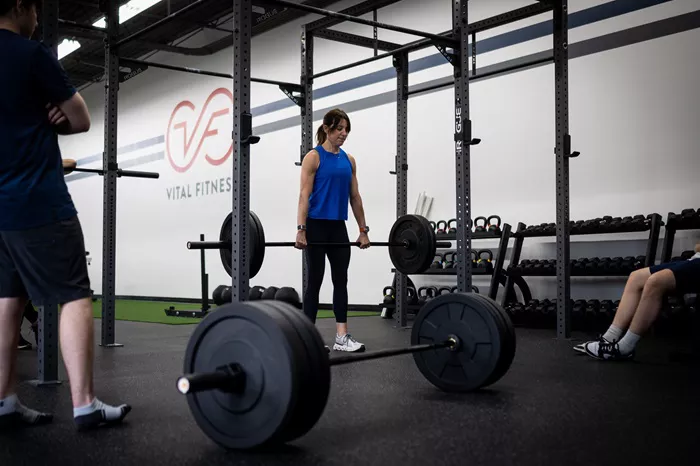Robyn Bruggeman, founder and chief instructor at Vital Fitness in St. Louis Park, encourages women to put down their light weights and challenge themselves with heavier lifting. With a background in engineering, she approaches fitness with an analytical mindset, designing workouts that are both effective and enjoyable. Bruggeman’s fitness journey began with aerobics and spinning, but boxing in college shifted her focus to strength and conditioning rather than just weight loss.
As CrossFit gained popularity in the early 2000s, she found a passion for functional fitness and movement mechanics. Watching others in class inspired her to help people improve their form and strength. During the early days of the pandemic, while experiencing perimenopause symptoms like mood swings, hot flashes, and fatigue, she sought education on fitness and hormones. An online menopause course through MedFit helped her understand how exercise could ease symptoms. She earned certifications in personal training and CrossFit, eventually opening Vital Fitness, which recently celebrated its first anniversary.
Her studio focuses especially on women in peri- and post-menopause, promoting heavy lifting to support hormone health. Bruggeman explains that exercise acts as a form of stress that helps the body adapt and build strength. For example, high-intensity workouts stimulate human growth hormone (HGH), which aids muscle and bone regeneration. While cortisol, a stress hormone, rises during exercise, it returns to normal levels afterward, helping the body become more resilient to stress.
Menopause causes a decline in estrogen, which is critical for muscle building and maintaining bone density. This leads to accelerated bone loss and muscle decline. Lifting heavy weights and doing plyometric exercises can slow or reverse this process. Men also benefit from these exercises as they face similar bone density and muscle loss due to lower testosterone with age. Additionally, heavy lifting combined with high-intensity interval training supports heart health, metabolism, and fat burning.
To overcome gym anxiety, Bruggeman advises finding a supportive community that welcomes all fitness levels. She emphasizes that learning proper technique is essential since fitness involves both the mind and body.
One common mistake she sees is people skipping meals before workouts. She stresses that eating something small before exercise helps lower cortisol levels and fuels performance. After workouts, consuming protein is crucial for muscle repair and growth, especially for women going through menopause. A small protein snack before exercise—like yogurt or peanut butter on toast—can be enough, and a 30-gram protein intake within an hour after exercising is ideal.
When it comes to music, Bruggeman enjoys a mix of styles during her workouts. Currently, she likes Cyril’s remake of “Stumblin’ In,” Nina Simone’s “Sinnerman,” upbeat Taylor Swift tracks, and ’90s rock bands like Pearl Jam and Guns N’ Roses.
Related Topics:
Store Brings Ready To Eat Healthy Meals To Newtown Borough
Free Summer Meals For Children At St Louis Libraries
Drinking Sugary Drinks After Salty Meals Could Risk Heart Health


